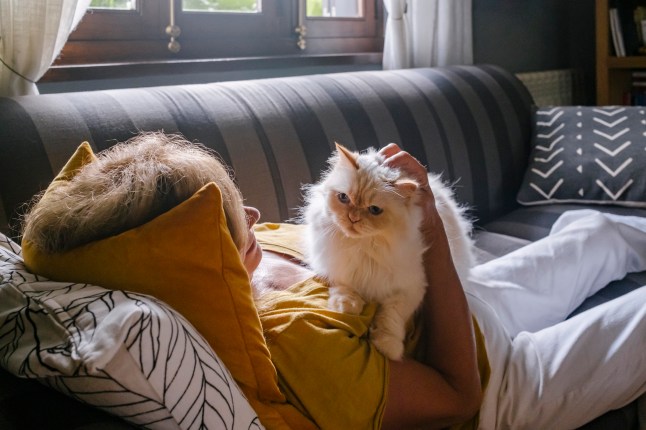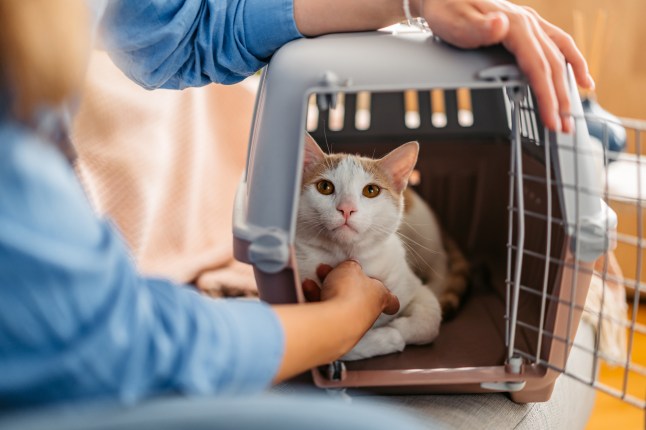
When you have a pet, you consider them a member of the family – but unlike our human relatives, they aren’t able to get healthcare on the NHS.
Meredith, from Newport, took this into account when she rescued her cat Snowy, but a diagnosis of feline diabetes is set to cost a whole lot more than she ever expected.
The 50-year-old has even considered rehoming the beloved pet due the rising cost of care, describing the vet bills she faces as ‘outrageous’.
In this week’s Money Problem, personal finance journalist and consumer champion, Sarah Davidson, offers guidance to hopefully keep Snowy at home where she belongs.
Submit your Metro Money Problem
If you’ve got a money problem you’d like Sarah to look into, fill in this online form or email sarah.davidson@metro.co.uk, providing as much detail about your situation as possible.
No issue is too big or small, and all submissions will be treated with the strictest confidence.
The problem…
I got my cat, Snowy, from a shelter a few years ago – and while I adore her, I’ve actually considered surrendering her back to the charity because of extortionate vet bills. I can cope with vaccinations, worming and flea treatments as I pay £15 a month for these as part of an annual healthcare plan, but it’s as though every time she has a check-up they have a new concern.
First it was a thyroid panel for £130 (this came back clear), then an X-ray of her heart for another £350 (also clear) and now she’s been diagnosed with diabetes, which has cost me about £200 so far. I’ve been quoted £150 a month for insulin alone but with stuff like special food and blood tests, her care could be far more expensive.
Although the staff at Snowy’s vets are lovely and none of this their fault, I can’t help but feel pet owners like me are being bled dry by private clinics. I don’t qualify for help schemes like the People’s Dispensary For Sick Animals or Blue Cross so I have no option to pay what local vets are charging – and don’t even get me started on the upselling and guilt-tripping if you hint you can’t afford it.
It seems like an absolute racket, but I can’t work out how to complain or fight against these companies’ outrageous fees. Is there anything I can do?
The advice…
As a pet owner myself, I really hear you Meredith. It is frankly egregious how much it can cost to give basic healthcare to our beloved animals. And because they are so loved, most of us simply find a way to scrape the money together every time.
Your plight has not gone unnoticed by the powers that be, however. The Competition and Markets Authority, the watchdog for fairness on topics such as vet fees, opened up the possibility of investigating this back in 2023.
After talking to more than 500 organisations, trade bodies, charities, pet owners and other interested parties, they are finally due to lay out their plans in September. The final rules are set to come into force in January 2026. From what they’ve said so far, it’s likely they plan to intervene.
They’ve found evidence that suggests vet bills have gone up by 60% or more between 2016 and 2023. Some vets are reportedly marking up medicines by three or four times the purchase cost. And all this, without any explanation to pet owners that they could get treatments far more cheaply by buying online, from pet shops, supermarkets or pharmacies.

In a blog published on the government website in June, Martin Coleman, panel chair of the CMA, revealed some fairly shocking (to my mind at least) views held by some vets.
Take this, for example: ‘The relationship between pet owners and vets is not purely transactional – trust is key – and we have heard suggestions that giving consumers more information so that they can better assess the choices available to them might damage this relationship.’
I’m sorry, but just think about this for a moment. Dressed down into normal words this effectively means – if vets told us how much they’re charging us on top of what we could pay elsewhere, we might not trust them as much as we did before.
Uh, no s*** Sherlock.
Listen to this, too: ‘Some responses suggested that greater awareness of available choices might lead pet owners to make decisions detrimental to a particular business. For example, knowing that medicines can be purchased more cheaply online might encourage pet owners to buy there instead.’
Again, really? This is akin to saying, if we knew that we could buy milk more cheaply in Aldi than we can in Waitrose, those of us who want cheaper milk might go to Aldi. Waitrose might lose that customer. So? It’s up to the customer where they shop and what’s important to them. In the land of supermarkets, we all know the difference. Effectively, some vets don’t want to admit how much money they’re making out of pet owners because it might dent their profits.
And this is another walloping statement from Mr Coleman: ‘Buying online could lead to savings on some medicines of up to 50% or more over many years.’
As you yourself have found, it’s nigh on impossible to complain and get a sensible response. Indeed, the CMA has found ‘considerable dissatisfaction with the complaints system’ across the market.
It’s important to say that these views are just that, views. And they don’t necessarily represent all of those operating in the veterinary services market.
It’s also the case that some vet practices are small, independently run businesses and with their own bills, stock costs, business rates and taxes going up, they have little choice but to raise their own prices. There is evidence that showing that some vets run on very low profit margins.
On the other hand, independent veterinary practices accounted for 89% of the UK industry in 2013. Now, 60% are owned by ‘the big six’ veterinary groups – CVS Group, IVC, Linnaeus, Medivet, Pets at Home and VetPartners.
I carried out some of my own research at Companies House. Many of these groups are operating on profit margins above 20%.
It seems crystal clear to any reasonable person that this market is broken. Pet owners who can afford the bills are being exploited. Pet owners who can’t are being forced to make heartbreaking choices that can result in animals suffering. Don’t even get me started on pet insurance, which can end up seeing owners pay large premiums on policies that, over time, stop covering pets’ most expensive vet bills.
It’s a scandal.
What can you do while the bureaucratic wrangling continues until the start of next year?
- Ignore the guilt-tripping and buy Snowy’s medicine online, from supermarkets or pharmacies. Check it’s a reliable retailer before you do here.
- Complain. You’ll need to do this formally in writing to your own vet first – if you’re polite about it, they may offer to negotiate their fees down. If you’re not happy with their response, complain to the Veterinary Client Mediation Service (VCMS). These complaints have to relate to service issues, but these include providing sufficient information about the practice, any conflicts of interest and their costs of services and medicines.
- Vets have a duty to be open and honest about their fees under the Royal College of Veterinary Surgeons’ professional code of conduct. Hold them to it.
- The Royal Society for the Prevention of Cruelty to Animals also advises asking your vet for a prescription if your pet needs medication and to research vet clinics around you. Some specifically aim to offer low-cost care and there are some not-for-profit clinics funded by companies such as the Animal Trust.
Sarah Davidson is an award-winning financial editor and head of research at WPB.
Got a money worry or dilemma? Email sarah.davidson@metro.co.uk







